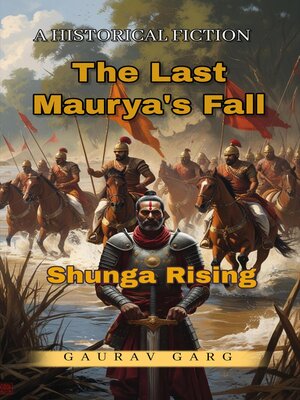
Sign up to save your library
With an OverDrive account, you can save your favorite libraries for at-a-glance information about availability. Find out more about OverDrive accounts.
Find this title in Libby, the library reading app by OverDrive.



Search for a digital library with this title
Title found at these libraries:
| Library Name | Distance |
|---|---|
| Loading... |
India, 185 BCE. The vast Mauryan Empire, legacy of Ashoka the Great, is crumbling. Its borders shrink under pressure from ambitious neighbors and fierce Yavana (Indo-Greek) invaders surging from the Bactrian kingdoms in the northwest. Its administration falters. Its army lacks direction. And on the ancient Lion Throne in Pataliputra sits Emperor Brihadratha, weak, indecisive, lost in palace luxuries while his inheritance disintegrates. Watching the decay with growing impatience and iron resolve is his Commander-in-Chief, the formidable Puṣyamitra Śuṅga – a brilliant strategist, a veteran soldier, and a devout Brahmin who believes the Mauryan deviation from ancient Vedic Dharma is the root of the realm's weakness.
Seeing no other path to salvation, Pushyamitra commits the ultimate treason. During a grand military review, he strikes down his master in full view of the army, declaring the end of the Mauryan line and the dawn of his own Shunga dynasty. But seizing power is merely the first act in a desperate struggle for survival. Pushyamitra must immediately consolidate his rule against loyalist remnants and treacherous court factions. He faces relentless invasions led by formidable Indo-Greek kings like Menander, who besiege sacred cities like Saketa and threaten the capital itself. He must quell internal rebellions, like that of the defiant King Yajnasena in Vidarbha, a task entrusted to his capable son, Prince Agnimitra.
To legitimize his bloody rise and rally support, Pushyamitra embraces the ancient ways his Mauryan predecessors discouraged. He revives the spectacular and perilous Ashvamedha horse sacrifice, not once, but twice, asserting his sovereignty through Vedic ritual, guided by Brahmin priests and scholars like the great grammarian Patanjali. He champions Sanskrit and traditional law, forging a new Shunga identity grounded in Brahmanical orthodoxy, even as the popular Buddhist faith proves resilient, its art flourishing at centres like Sanchi.
"The Brahmin General" brings to life a pivotal, forgotten era of Indian history through the eyes of one of its most controversial and consequential figures. It is an epic saga of ambition, betrayal, warfare, political intrigue, religious revival, and the enduring struggle for power and legitimacy in the ashes of a fallen empire. Can Pushyamitra Shunga save Magadha from chaos, or will the violence of his rise consume his own dynasty?







